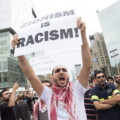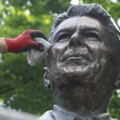We’ve published two Hub Dialogues so far this week and while both conversations are fascinating, they might seem like a funny pair. They don’t outwardly have a lot in common. They’re quite different thinkers on different topics with different tones and perspectives.
The first one was with long-time Harvard economist Benjamin Friedman on his latest book about the relationship between eighteenth-century religious ideas and values and the rise of modern Western economics. Professor Friedman is scholarly and dispassionate. His book is a pure intellectual exercise in which new and interesting knowledge is the ultimate purpose.
The second dialogue was with public intellectual and iconoclast Michael Shellenberger on his provocative book, San Fransicko: Why Progressives Ruin Cities. While Shellenberger is highly credentialed and broadly empirical, he also has a well-earned reputation as a citizen journalist and a passionate advocate for his point-of-view. He doesn’t write merely for knowledge’s sake. He also aims to provoke, engage, and ultimately shape contemporary political debates.
The 77-year-old Friedman doesn’t have a Twitter account. Shellenberger tweets daily for his more than 150,000 followers. In journalistic terms, if Friedman is the New York Times, then Shellenberger is Substack.
Yet, notwithstanding these differences, there is a common theme that runs through both dialogues. It is the notion of human agency: what Friedman calls the “possibilities of human choice, human action, and human decisions.”
In his book, he observes that Protestant views about human agency and individual autonomy gave rise to Western economics in the Adam Smith tradition. A religious worldview that granted a role for individuals to shape their own lives and the world around them was far more conducive to the conception of modern capitalism than the predestinarian religious thinking that had predated it.
Shellenberger takes up the question of human agency when he discusses the failure of progressive policymaking to address the drug crisis in San Francisco. He argues that the prevailing views in favour of safe injection sites, government-provided safe supply, and a general permissive to public drug use presumes that both policymakers and addicts are helpless to address the underlying issues and the only option is to supply addicts with access to drugs. Shellenberger describes these policy developments as the outgrowth of a “victim ideology” whereby traditional ideas about human agency and personal responsibility have increasingly been replaced by a crude binary between victims and oppressors.
Drug policy isn’t the only area in which he’s been critical of modern society’s diminished sense of human agency. In his previous articles and books on climate change, Shellenberger has consistently challenged those in the degrowth movement who believe that the only way to mitigate the effects of climate change is to have the human race accept stagnant or declining living standards. His alternative argument is that we have the means in innovation and technology (including nuclear energy) to address climate change without sacrificing our living standards in the developed world or the process of pulling people out of poverty in the developing world.
The upshot: although Friedman and Shellenberger may not outwardly have a lot in common, they both place human agency at the centre of their understanding of culture, economics, and politics.
That perspective seems to be in diminished standing these days. So much of our popular discourse on a number of issues starts from the premise that there’s not much that we can do as individuals or collectively to address problems or shape outcomes. We seem to be living in something of a Marxist ascendancy in which there’s a prevailing assumption that our present and future conditions are functions of big, impersonal, and structural forces that will invariably overwhelm the choices and actions of individuals.
This modern version isn’t necessarily statist, though it may ultimately prove to be. It’s instead found expression in the rise of identity politics which organizes society according to a set of immutable characteristics such as race, gender, age, and sexual orientation. This line of thinking is gaining much greater ground—particularly in major institutions such as large companies, news media, and schools—than Marxist-inspired economics ever did. Recent cases at Yale law school, the Ontario Secondary School Teachers’ Federation, and various Silicon Valley firms reflect the growing fecundity of what are sometimes described as “structuralist” ideas.
The human agency side of the spectrum has a built-in advantage over the structuralists.
The basic premise is that individuals are fundamentally defined by these immutable characteristics. This structuralist worldview then presupposes that there are inherent limits on one’s ability to separate him or herself from their particular identity group. Regardless of our individual talents or efforts, we must accept that our lives are subject to these structural forces outside of our control.
If one aggregates these individual expressions of identity politics across the broader economy and society, it may help to explain the stagnation and sense of a diminished future that permeates the modern age. If no one controls his or her fate—if talent and effort do not ultimately matter—then what’s the point? No wonder we’ve thrown ourselves into the virtual worlds of online video games and pornography. Those virtual mediums at least provide a fleeting if not false sense of control over own’s choices and actions.
Now one can anticipate the criticism that to challenge these ideas is to default to a “pull-yourself-up-by-your-bootstraps” mentality that ignores the presence of privilege or discrimination in our society. That’s not the case at all. There are of course limits to human agency and personal responsibility. No one doubts that there’s such a thing as what Warren Buffett has called the “ovarian lottery.” There are often invisible yet powerful forces—including those sometimes perpetuated by government policy—that can make it difficult for certain individuals to overcome their disadvantages.
At its best, the structuralist tradition forces us to think about how government and civil society can help people prevail over their disadvantages. At its worst, though, as we’ve increasingly seen, it can cause us to be defined by them.
It would be a fundamental mistake to throw in the towel on human agency and personal responsibility. It’s not only harmful at the individual level in the form of what’s sometimes called “learned helplessness” but it can also have profound effects at the collective level. Our horizons can become necessarily limited, a sense of powerlessness can overcome our politics and culture, and a zero-sum polarization can take root. We can cease seeing ourselves as drivers of history and start to view ourselves as mere observers or even oppressed victims of a self-perpetuating History with a capital “H”.
One gets the sense that the mainstreaming of the latter viewpoint may eventually come to reshape our ideological and political divide. It might precipitate a shift from a conventional Left-Right spectrum to one instead based on these competing views about human action and its influence over the world.
On one side, you’ll have the structuralists who emphasize the immutable characteristics and structural dynamics that place constraints on individual and collective agency. On the other side, you’ll have those like Friedman and Shellenberger who may disagree on a whole host of issues but who fundamentally believe in what Friedman described as a “more expansive, more optimistic view of the possibilities for human choice and human agency.”
One has to assume that in such a political contest, the human agency side of the spectrum has a built-in advantage over the structuralists. Their message is not only more positive and aspirational but it’s rooted in an understanding of the equitable distribution of human dignity.
Contrast that with the inherent negativity and divisiveness of a worldview defined solely by race, gender, ethnicity, or sexual orientation. It’s not only a broadly wrong frame for thinking about human actions and choices, but it’s such a corrosive idea. What are we supposed to do with that? What will give people meaning and purpose if they’re told that they essentially have no control over their lives?
We’ve had a window into such an environment during the COVID-19 pandemic. People have been forced to give up control over various parts of their economic and social lives and the consequences have been profound. We’ve seen a spike in opioid deaths in Canada, a massive rise in homicide and violence in American cities, and a growing sense of anxiety and despair across our populations.
These are the tragic consequences of a set of circumstances that have caused people to feel like they’ve surrendered their sense of individual agency and in turn succumbed to a collective aimlessness. The Hub published polling in September 2021, for instance, that showed that nearly 50 percent of Canadians said that they didn’t know what the future holds. That means that roughly half of our population feels like it has relinquished control over their lives to the virus and the public health bureaucracy responsible for managing it.
As readers will know from The Hub’s founding essay, we are troubled by these developments precisely because we subscribe to the Friedman-Shellenberger school of thought. We believe in an expansive view of human agency and regret that a diminished sense of personal responsibility has come to manifest itself in lowered expectations about the future.
We’re buoyed, however, by an abiding confidence that there exists a broad-based coalition of people for whom the idea of human agency still resonates. These people will doubtless recognize that some of us are luckier than others or that systemic issues still disadvantage too many in our society. They may even disagree about how best to extend opportunity or address the disadvantages that stand in its way.
But they can still come together around the basic idea shared by the odd pair of Friedman and Shellenberger: the history of the future is written by people, by us, and our individual and collective choices.
Recommended for You

MAID is devaluing the lives of Canadians with dementia

A definition of racism that targets Jews is racist

In defence of Ronald Reagan

Vancouver Parks’ Harry Potter freak out and how the media covers ‘controversial’ events




